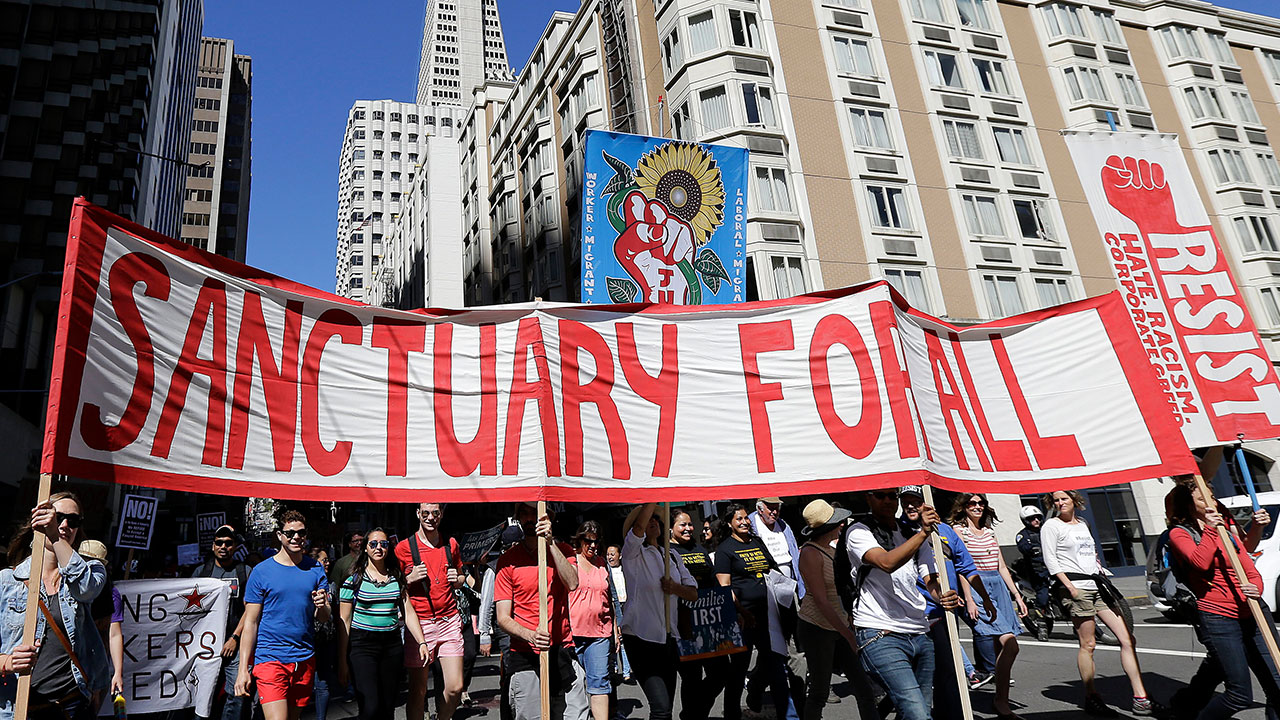When the immigrant community fears that contact with local police could lead to deportation, they don’t report crimes, provide witness testimony, or otherwise interact with local police, leaving cities less safe.
Sanctuary policies and laws restrict when and how local law enforcement can engage with the federal government in immigration enforcement, in order to maintain local law enforcement’s ability to work with and in the immigrant community. These cities cannot actually shield anyone from deportation, however, or prevent the federal government from enforcing immigration law within their city limits.
Sanctuary cities are one of the administration’s favorite targets—and a frequent punching bag for anti-immigrant politicians and commentators. Unfortunately, public discussion of this issue reveals serious misunderstanding of what the law actually says—fueled, no doubt, by the misinformation the Trump administration is actively spreading.
Here are the facts:
There is no definition of “sanctuary city” in federal law. It’s a political term, not a legal one. A variety of policies fall under the broad umbrella of what people call “sanctuary cities,” and a city, county, or state may have such policies without declaring itself a “sanctuary.” On the other hand, a city may call itself a “sanctuary city” or a “welcoming city” without implementing any new policies.
Sanctuary cities are NOT violating federal law. Despite what the president and the attorney general say, cities and counties are NOT required to enforce federal immigration law in any way. The only federal law on this issue is 8 U.S.C. § 1373, and all it says is that cities and counties cannot prohibit communication with the federal government regarding a person’s citizenship or immigration status. That’s it—there is no requirement that cities or counties actually do anything.
Sanctuary cities that decline detainer requests are respecting the Constitution. Numerous courts have found that cities and counties that comply with ICE detainer requests in the absence of a judicial warrant are violating the Fourth Amendment to the Constitution, and have required them to pay money to the people they held in jail.
President Trump’s anti-sanctuary executive order is currently enjoined nationwide. Although this decision has been appealed, the executive order that threatens to defund sanctuary cities cannot be enforced right now.
The president’s and attorney general’s threats to “defund” sanctuary cities are hollow because any such defunding would be unconstitutional. The Department of Justice admitted as much in a hearing in federal court, arguing that the executive order is just political posturing and does not actually change the law—although President Trump and Attorney General Sessions continue to threaten sanctuary cities with unconstitutional defunding. A federal court determined that such defunding would violate the Tenth Amendment, the spending power vested solely in Congress, and procedural and substantive due process protections.
Sanctuary policies make communities safer. Police departments and sheriffs across the country agree that sanctuary policies encourage communication between immigrant residents and law enforcement, making everyone safer. If some people in the community are afraid to call the police when they’re in danger, or to serve as a witness in a criminal case, it makes it harder for the police to solve crimes and harder for D.A.s to prosecute criminals. Statistics show that cities with sanctuary policies actually have lower crime rates than those without.
Cities, counties, and states that want to comply with the Constitution and promote communication between their residents and law enforcement have a number of policy options:
- Not complying with detainer requests unless they come with a judicial warrant;
- Not collecting immigration-related information in the provision of city services unless otherwise required by state or federal law;
- Not allowing local funds, personnel, or facilities to be used for immigration enforcement;
- Declaring schools and courthouses to be safe places where people can go without fearing immigration enforcement activities or raids;
- Not allowing ICE or other DHS agents into local jails;
- Requiring notice to people in jail if ICE or DHS wants to talk to them for any reason;
- Requiring ICE and DHS to notify an inmate’s attorney prior to talking to them for any reason and to certify having done so;
- Requiring ICE and DHS officers to identify themselves and wear duty jackets if allowed into any local facilities;
- Not discriminating on the basis of alienage or immigration status in the provision of city services unless otherwise required by state or federal law; and
- Providing funding for legal representation for local residents in immigration proceedings.
Amicus briefs in sanctuary cases
The Southern Poverty Law Center has filed the following “friend-of-the-court” briefs, also known as amicus briefs, to defend sanctuary policies in the cases below.
City and County of San Francisco v. Donald J. Trump, et al.
City of Chicago v. Jefferson B. Sessions III
County of Santa Clara v. Donald J. Trump, et al.



